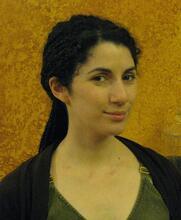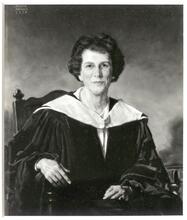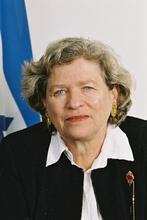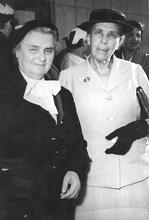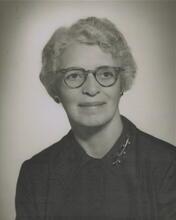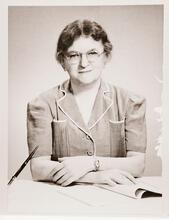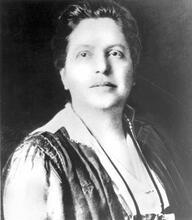Mindel Cherniack Sheps
As a pioneering physician, biostatistician, and demographer, Mindel Cherniack Sheps, born in Winnipeg in 1913, was acutely aware of the role science could play as a powerful social force. She taught that peace, social justice, and science were inextricably bound; humanism in any field must be based on social equity and knowledge. Of incisive intellect, firm conviction, and great humor, despising hypocrisy and dishonesty, she was a superb teacher and an avid learner. Sheps died on January 15, 1973, in Durham, North Carolina. Although short, her epitaph, “To see things plain and still to care,” summed up her conviction that cynicism, particularly for a scientist, was an abdication of responsibility.
As a physician, biostatistician, and demographer, Mindel Cherniack Sheps was acutely aware of the role science could play as a powerful social force. She taught that peace, social justice, and science were inextricably bound; humanism in any field must be based on social equity and knowledge. Of incisive intellect, firm conviction, and great humor, despising hypocrisy and dishonesty, she was a superb teacher and an avid learner.
Early Life and Education
Sheps was born in Winnipeg, Manitoba, Canada on May 20, 1913. Her parents, Joseph and Fania (Golden) Cherniack, emigrés from southern Russia, were committed socialist Zionists and were instrumental in enhancing the yiddishkeit movement in Canada. Her father was a lawyer, widely respected in the Canadian Jewish community for his comprehensive knowledge of Yiddish and his application of the wisdom of that literature to law and society. Mindel Sheps was later to apply this knowledge to science. Her brother, Saul Cherniack, became minister of finance in the New Democratic Party government in the early 1970s.
After attending I. L. Peretz Shule and St. Johns High School, Mindel was one of the few Jewish women admitted, under a strict quota system, to medical school at the University of Manitoba, graduating in 1936. She received a master’s degree in public health from the University of North Carolina in 1950 and an honorary doctorate of science from the University of Manitoba in 1971.
She married Cecil George Sheps in 1937, after interning in Saskatoon in 1935. As a resident at the Children’s Hospital in Winnipeg in 1937, she became acutely aware of the social issues underlying maternal and child health. In 1938, she and her husband went to London, England, where she worked at the Marie Curie Hospital in Whitechapel, further observing the effects of poverty on health. When she returned to Winnipeg, she went into general practice from 1939 to 1944, joined the Cooperative Commonwealth Federation (CCF) Party, and ran successfully for the Winnipeg School Board in 1942.
Political and Academic Career
In 1944, after a CCF electoral victory in Saskatchewan, Sheps became secretary to the Health Commission in that province. In this position, she surveyed hospital services and strongly supported the hospital insurance scheme enacted in 1945, the first in North America, giving political expression to her experiences and leading her toward a broader vision of epidemiology and the social factors influencing the health of individuals and populations. In this vision she was firmly supported by her husband, who was also trained in public health, health administration, and health services research. Their only child, Samuel, adopted when they were in Saskatchewan, later continued in their footsteps as a physician, epidemiologist, and health services researcher.
Further training in public health established Sheps as a leading thinker in the fields of statistics and demography. She held academic positions at the University of North Carolina, Columbia University, and the University of Pittsburgh. She was also highly regarded in numerous professional associations, including the American Population Association, the Biometrics Association, the American Association for the Advancement of Science, the American Public Health Association, and the International Union for the Scientific Study of Populations.
While trained in mathematics and biostatistics, Sheps was largely self-taught in demography, publishing in that field almost exclusively after 1963 and achieving an international reputation. Her interest in demography stemmed from a strong social conscience, from her experience in the 1940s as a physician, school board member, and particularly from the struggle of Planned Parenthood for recognition in Winnipeg. She was intellectually stimulated by biostatistical applications in demography, and a critical element of her work was her recognition of the links among poverty, fundamental social inequality, and population growth. For Sheps, demography became a science that could achieve social justice and clarify issues of women’s rights and equality. Her statistical and demographic research was innovative and insightful, founded on solid mathematical principles; however, it was the social application of this knowledge that she believed to be crucial. A major prize in her name, recognizing the importance of such application, was established by the American Population Association in 1974.
Legacy
When receiving her honorary doctorate of science degree, Sheps said: “The only hope of solving the problems of this planet lies in the application of scientific understanding and skills in the service of human dignity, freedom, and welfare. … I suggest it would be well to approach all human problems with humanity, with a strong sense of the limitation of our knowledge and of the existence of large areas of ignorance, and with readiness to admit the errors we made. In short, we must approach human problems in the best traditions of science.”
Mindel Sheps died on January 15, 1973, in Durham, North Carolina. Although short, her epitaph, “To see things plain and still to care,” summed up her conviction that cynicism, particularly for a scientist, was an abdication of responsibility.
Selected Works
Articles
“An Analytic Simulation Model for Human Reproduction with Demographic and Biologic Components,” with C.J. Ridley. Population Studies 19 (1966): 297–310.
“Approaches to the Quality of Hospital Care.” Public Health Reports 70 (1955): 877–886.
“Changes in Birth Rates as a Function of Contraceptive Effectiveness: Some Applications of a Stochastic Model,” with E.B. Perrin. American Journal of Public Health 53 (1963): 1031–1046.
“An Examination of Some Methods of Comparing Several Rates or Proportions.” Biometrics 15 (1959): 87–97; “Health Reform in Saskatchewan.” Public Affairs (Winter 1945): 79–83.
“A Model for Studying Birth Rates Given Time Dependent Changes in Reproductive Parameters,” with J.A. Menken. Biometrics 27 (1971): 325–343.
“On Estimating the Risk of Conception from Censored Data,” with J.A. Menken. In Population Dynamics, ed. T.N.E. Greville. New York: Academic Press, 1972.
“Probability Models for Family Building: An Analytic Review,” with J.A. Menken and A.P. Radnick. Demography 6 (1969): 161–183.
“Saskatchewan Plans for Health Services.” Canadian Journal of Public Health 36 (1945): 175–180.
“Shall We Count the Living or the Dead.” New England Journal of Medicine 259 (1958): 1210–1214.
Books
Mathematical Models of Conception and Birth, with Jane A. Menken. Chicago: University of Chicago Press, 1973.
On the Measurement of Human Fertility: Selected Writings of Louis Henry, ed. with Evelyne Lapierre-Adamcyk. New York: Elsevier, 1972.
Public Health and Population Change: Current Research Issues, ed. with Jeanne Claire Ridley, Pittsburgh: University of Pittsburgh Press, 1965.
Obituary. NYTimes, January 17, 1973, 42:1.
WWWIA 6.


